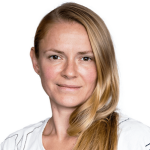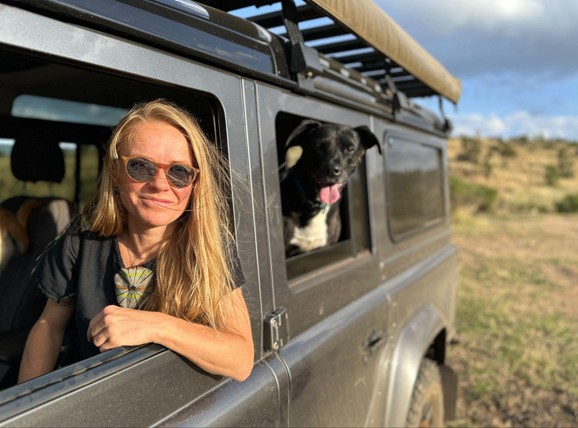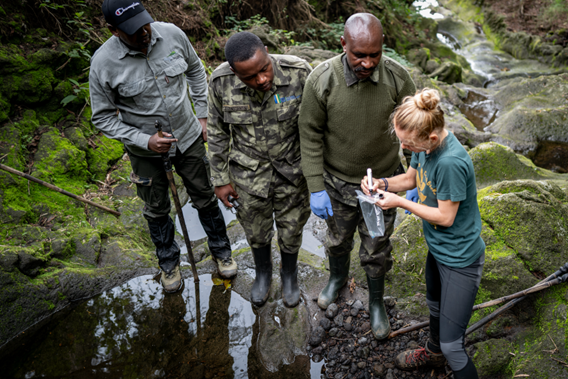Moving from Biotech to Nature

Kaja Wasik, co-founder, former chief scientific officer, Variant Bio
Everything started with my love for animals.
I studied biology and journalism at the University of Warsaw — science because I loved nature, and journalism because I believed it would be my escape from the confines of post-communist Poland.
I yearned to explore the world with friends, and did a variety of jobs – waiting tables, gorilla zookeeping, blackjack dealing – to scrape together cash for travel. Each trip would inevitably end with me in the emergency room waiting for a rabies shot after feeding an overzealous stray dog or cat. My dream of being a foreign correspondent was not to be. Science carried me across the oceans.
After completing my PhD at Cold Spring Harbor Laboratory in New York, I moved to the New York Genome Center and spun up my first company, Gencove. That company democratized genomic access by focusing on computation combined with low-coverage sequencing to make novel genomic discoveries at a fraction of the cost of previous methods.
But I wanted to do something that combined my love of the world, ethical sensibilities, and desire to do groundbreaking science. Over cocktails in a New York City bar, one of my best friends and a brilliant geneticist, Stephane Castel, and I came up with a concept that became Variant Bio.
Medicines Based on Diverse Genomes
Variant was inspired by methods from population genetics that pushed the boundaries of imagination on population-wide approaches to new drug target discovery.
Variant Bio was met with skepticism by many who thought it was too risky. We partnered with diverse populations around the world who harnessed unusual genetic or epidemiological traits. We sequenced their genomes and performed deep phenotyping to identify single genetic variants with strong effects that point to ideas for novel therapeutics for common diseases across humanity.
The company, founded in 2018, has delivered on this concept. It now has five therapeutics programs in preclinical development for kidney disease, fibrosis, and inflammation-immunology.
What I am most proud of, however, is Variant’s paradigm-shifting approach to engagement and benefit sharing with our partner communities. These are often vulnerable groups, overlooked by science and not reaping its benefits. Many are naturally wary of collaborating with scientists from abroad, given the long history of colonial exploitation.
Variant sought to overcome this challenge by creating a new kind of discovery partnership. We committed to sharing 4% of our revenue in perpetuity and are about to deliver on that promise for the first time. The company just announced a $50 million partnership with Novo Nordisk, which is Variant’s first revenue. This is a great—and still rare—example of completing the circle, delivering financial benefits to the original research contributors.
Seeking New Challenges in Africa
I left my job as chief scientific officer of Variant Bio in September 2023. Five years at Variant reminded me that nature and human health are interconnected—there are no healthy communities without healthy ecosystems. I had spent a lot of time in the office and in the usual business settings. It was time to fall back in love with nature.
In September 2023, I ignored everyone who said it was crazy, gave my ski boots and paddleboard to Stephane, and moved from Seattle to Kenya. That was the first country that I ever visited outside of Europe. It was home to my godfather, an economist and a Kikuyu community member. My journey resembled a small-scale Noah’s Ark, including three stops and my dog, Lulu, and my cat, Chairman Meow.

Kaja and Lulu in Kenya
Ten days later, I woke up in a conservancy that I would call home. Elephants regularly broke through the fence. Hungry baboons stole the leeks in the vegetable garden. A black mamba, one of the world’s deadliest snakes, lurked around the house. In case of a bite, I was told, pour a whiskey to enjoy for a half hour before you die.
Humans live close to nature in this part of the world. Time moves differently. (Unfortunately, Chairman Meow was somewhat under-par and went out in a blaze of glory. After the best year of his life, at the ripe age of 14, he came face to face with his much larger cousin. Chairman was as feisty as his namesake, but a leopard is a leopard. Lulu is doing well. She was always the more sensible one.)
I wanted this after years of the fast life as a biotech executive. At least for a while. I found new work in Kenya to create ways of securing and financing the planet’s most essential, yet often ignored, infrastructure: nature itself.
Finding Balance Between Humans and Nature
I’ve worked on two projects that feel like extensions of my work in biotech, albeit through a new lens. I started the Tehanu Foundation, that builds on recent advances in blockchain and AI to create an economy for a beloved and threatened species – mountain gorillas in Rwanda.
Here’s how it works. Rwandan gorillas get digital identities and wallets. Through expert knowledge and artificial intelligence, these “financially empowered” gorillas gain access to resources they need. (Think food, water, shelter, and peaceful territory to roam without too much human encroachment).
The gorillas now have a capacity to better communicate what they need and want, which hopefully will help their populations grow, rather than dwindle. This is a new model for integration of nature into human economies and for building a more equitable future, Tehanu is also a flagbearer for the UN Sustainable Development Goal for “Life on Land”, a finalist for the 2024 XPRIZE Rainforest, and selected by The Economist as a promising technology for 2025.

Kaja training Rwandan Volcano National Park rangers in environmental DNA collection.
I also spent time working with Natural State, a nature restoration-focused NGO. Here, I got the opportunity to experiment with creating standardized metrics of ecosystem health. This work mirrors genetic analysis techniques. We rely on large amounts of robust and unstructured sound and visual data to evaluate landscapes without the painstaking need for species-specific annotations. To understand the health of an ecosystem, we don’t need to completely understand it — we only need a useful representation.
All of this work culminated in creating “Echo.” Echo draws from both Natural State and Tehanu. It combines scientific rigor with aligned economic incentives and ecological stewardship. Echo is still in stealth, but I have high hopes.
This “biotech sabbatical” has been an eye-opening experience of learning that humans urgently need to reconnect with nature.
Basic Health Gaps
Life in East Africa has come with a few lessons about health economies. While the US is leaping ahead in personalized medicine, and biology is becoming engineering,
A woman named Stella recently collapsed outside my house, and I helped rush her to the hospital. She had been living with undiagnosed diabetes and hadn’t seen a doctor in 15 years. She is now receiving treatment but was not familiar with the concept of routine health screenings.
Three years ago, the major health concern in Kenya would have still been malaria, HIV, or tuberculosis, but now those have been overshadowed by non-communicable diseases. Diabetes has become the biggest health challenge in Kenya, according to Stella’s doctor.
In other ways, healthcare in Kenya shines. After a recent bite, I once again needed a rabies shot. Seven minutes later, I paid $9 USD and felt invigorated antibodies cruising a familiar course through my veins.
A complete rabies course requires five shots within a few weeks, and sometimes that interferes with international travel. Needing another shot back in the US at Princeton University, I believed this would be fast and easy. Wrong. After being turned down again and again, I found myself staring at a $3,000 USD bill from Princeton Hospital ER. Something’s gone off the rails with access to medical basics in the US.
Coming Home for What’s Next
Soon it will be time to come home. For me, this time away hasn’t been about retreating. It’s more about reaffirming my most important driving forces: working on unconventional ideas, challenging norms, and supporting a strong mission.
I anticipate a lot of failures. Mistakes are inevitable if you want to try something never done before. Sometimes, you need to step out of the lab, or the office, or the continent — to see the bigger picture. Whether it’s delivering medicines to underserved communities or empowering gorillas with digital wallets, my goal is the same: to create systems that benefit everyone — human and non-human alike.
There’s a lot of work to do.



